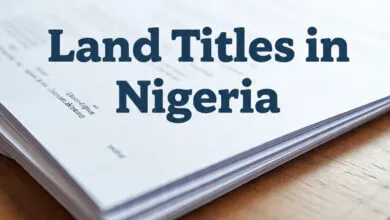How To Avoid Land Disputes When Buying Community Land

It is no news that buying land in Nigeria is indeed a bold and rewarding move, especially as land values continue to appreciate across the country. However, family and community land, often seen as cheaper and easier to acquire, come with challenges. One of the biggest? Land disputes. From multiple ownership claims to undocumented sales, many innocent buyers have lost their life savings due to ignorance or poor due diligence.
In this post, you’ll discover the hidden truths about buying community land and learn how to avoid common traps.
What Exactly Is Community or Family Land?
In simple terms, community or family land is land owned collectively by a group, be it an extended family, a village, or a local community. No one person has exclusive rights to sell it. These lands are often passed down through generations and managed by elders, family heads, or local chiefs.
In Nigeria, land ownership is categorized under two primary systems: statutory and customary. Community or family lands fall under the customary tenure system. These lands are prevalent in rural areas and are often passed down through generations without formal documentation.
Therefore, the absence of formal titles or clear documentation can lead to multiple claims of ownership, making transactions involving such lands particularly sensitive.
Why Land Disputes Are So Common with Community Land
There are several reasons land disputes are rampant when it comes to family or communal land:
- Multiple Claims of Ownership: Due to the collective nature of ownership, different family members or community factions might claim rights to the same parcel of land, leading to conflicts.
- Lack of Formal Documentation: Many community lands lack registered titles or survey plans, making it challenging to verify ownership or boundaries.
- Unauthorised Sales: Individuals without the consent of the family or community may attempt to sell land, leading to disputes when other members contest the sale.
- Boundary Disagreements: Undefined or poorly marked boundaries can result in overlapping claims with neighbouring lands.
- Inheritance Conflicts: Some buyers assume payment alone secures the land, when in reality, cultural rites or community blessings may still be required. Disputes often arise when land is inherited without clear succession plans, leading to disagreements among heirs.
Red Flags to Avoid When Buying Community Land to Avoid Dispute
Be cautious if you encounter any of these during your buying process:
- The seller discourages the use of a lawyer.
This often means they’re hiding something. - You’re dealing with only one person.
For family land, all stakeholders must give written consent. - The price is suspiciously low.
If it seems too good to be true, it probably is. - No survey or title documents are available.
Always request a registered survey and any proof of ownership. - You’re told “everything will be sorted later.”
That’s a classic trap for future trouble.
Steps to Safely Purchase Community Land to Avoid Land Dispute
- Conduct Thorough Due Diligence:
- Engage with All Stakeholders: Ensure that all relevant family or community members know and consent to the sale.
- Verify Ownership: Request any available documents, such as a family resolution or customary right of occupancy, and cross-check with local authorities.
- Engage with All Stakeholders: Ensure that all relevant family or community members know and consent to the sale.
- Engage Legal Expertise:
- Hire a Real Estate Lawyer: A lawyer experienced in land transactions can help navigate the complexities of customary land purchases, draft necessary agreements, and ensure compliance with legal requirements.
- Hire a Real Estate Lawyer: A lawyer experienced in land transactions can help navigate the complexities of customary land purchases, draft necessary agreements, and ensure compliance with legal requirements.
- Obtain Necessary Documentation:
- Survey Plan: Commission a registered surveyor to produce a survey plan, which defines the land’s boundaries and can be used for future registration.
- Deed of Assignment: This legal document transfers ownership from the seller to the buyer and should be duly executed and registered.
- Survey Plan: Commission a registered surveyor to produce a survey plan, which defines the land’s boundaries and can be used for future registration.
- Community Engagement:
- Consult Local Leaders: Engage with community heads or traditional rulers to gain their endorsement and ensure the sale aligns with customary practices.
- Public Acknowledgement: Publicly acknowledging the transaction within the community can deter future disputes.
- Consult Local Leaders: Engage with community heads or traditional rulers to gain their endorsement and ensure the sale aligns with customary practices.
- Physical Inspection:
- Visit the Site: Inspect the land to ensure it is free from encroachments or ongoing disputes.
- Engage Neighbours: Speaking with neighbouring landowners can provide insights into existing issues or claims.
- Visit the Site: Inspect the land to ensure it is free from encroachments or ongoing disputes.
What If a Community Land Dispute Still Comes Up?
Even after taking precautions, issues can still arise. Here’s what to do:
- Don’t engage physically. Violence or confrontation will only worsen things.
- Reach out to your lawyer immediately. Legal guidance is key in resolving land matters.
- Explore alternative dispute resolution (ADR). In many cases, community dialogue or mediation resolves disputes..
- Prepare for court if needed. If resolution fails, your documents and due diligence will be your defence.
Additionally, you can consider Alternative Dispute Resolution (ADR) in Land Matters before resorting to litigation by;
- Mediation: Involves a neutral third party facilitating discussions between disputing parties to reach a mutual agreement.
- Arbitration: A neutral arbitrator hears both sides and makes a binding decision.
- Community Elders’ Intervention: In many Nigerian communities, elders play a pivotal role in resolving disputes based on customary laws and traditions.
Therefore, ADR methods resolve disputes quickly, cost-effectively, and preserve community harmony.
Long-Term Tips to Avoid Community Land Disputes
- Regularly visit the land to show an active presence and reduce the chances of encroachment.
- Consider fencing the land to mark your boundaries and discourage intruders.
- Engage the local community. Supporting minor development projects or hiring locals can build goodwill.
Conclusion
Community land can be a golden opportunity or a financial disaster, depending on how you handle the process. Don’t let the low price fool you into ignoring legal and cultural red flags. Always approach community land purchases with caution, clarity, and professional support. ASK THE RIGHT QUESTIONS!
- Does the family or group truly own the land?
- Has there been any dispute over this land in the past?
- Who has the right to sell land in this family/community?
- Do other members agree to this sale?
- Can we get a written confirmation or letter of consent?
Also, you can ask for historical context, such as how the land was inherited or whether any family members have tried to sell it before.
Remember, what you don’t know can cost you everything in land transactions.
Ready to Invest Smartly in Real Estate?
Whether you’re a first-time buyer or a seasoned investor, our team is here to help you secure genuine land with peace of mind.
Contact us today for trusted real estate advice and seamless land transactions.
Follow us on Instagram/Facebook for updates and amazing investment opportunities you don’t want to miss!




